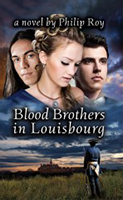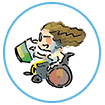 Summary: The stories of two teens interweave in 1700s Louisbourg, located in pre-Cape Breton Island. Jacques has been forced by his military father to leave his home in France to serve at the Fortress of Louisburg, and Two-feathers has encountered the Fortress in a search for his birth father, whom he knows is a Frenchman. Friendship with Celestine is the only connecting link between the two, because neither is aware of the real connection that binds them together. As the war between England and France comes to a head in the New World, Two-feathers must choose between love and duty to his people, while Jacques is freed from his obligations in a tragic way.
Summary: The stories of two teens interweave in 1700s Louisbourg, located in pre-Cape Breton Island. Jacques has been forced by his military father to leave his home in France to serve at the Fortress of Louisburg, and Two-feathers has encountered the Fortress in a search for his birth father, whom he knows is a Frenchman. Friendship with Celestine is the only connecting link between the two, because neither is aware of the real connection that binds them together. As the war between England and France comes to a head in the New World, Two-feathers must choose between love and duty to his people, while Jacques is freed from his obligations in a tragic way.
Number of Pages: 142
Age Range: 17-18
Review: Jacques’ philosophical views against the war and Two-feather’s Metis status make them both outsiders in Blood Brothers in Louisbourg, and shrewd observers of the war between the French and the English resulting in the fall of the Fortress of Louisbourg. I truly enjoyed both of their perspectives, because being on the outside of a situation allows you to see the whole picture of what is really going on.
Philip Roy’s writing is richly detailed, and it is clear he has done his research on everything from philosophers in the 1700s to Native practices and rituals. Blood Brothers in Louisbourg is a thoughtful, philosophical exploration of the topics of war, personal fulfilment, and finding where you belong that I would recommend to older, dedicated teen readers, as well as readers interested in learning more about Mi’kmaq and Metis.
Memorable Quotes:
“Two-feathers’ greatest skill was moving through the woods with invisibility. This he had learned from his teachers, but also from the animal spirits. To carry invisibility you had to first believe that you were. Them you could cross the snow-covered river leaving no tracks because you had no weight. You could pass through the woods in silence because you made no sound. You could slip between trees unseen because you had no shape and cast no shadow. Only then, when you felt this way, could you move amongst strangers without them seeing you.” – Two-feathers from Blood Brothers in Louisbourg by Philip Roy, page 16
“The fortunes of life, Boethius had written over a thousand years earlier, spun around and around like a wheel. We should never feel too unhappy when things are bad, he said, because the wheel is always turning and they will eventually improve. Similarly, we ought never to get too comfortable when things are good, because the wheel will surely turn down again. I never bothered to mention this philosophy to my father. I didn’t think he would have cared for it.” – Jacques from Blood Brothers in Louisbourg by Philip Roy, page 52
“Watching my father was a little bit like watching a spoiled child who got excited when things went his way but threw a tantrum when they didn’t.” – Jacques from Blood Brothers in Louisbourg by Philip Roy, page 78
“We had become friends. We were about the same age and were both stuck somewhere we didn’t want to be and were just trying to survive it. Music helped us do that.” – Jacques from Blood Brothers in Louisbourg by Philip Roy, page 84
“He spent many hours contemplating this and finally concluded that it was because of her willingness to accept whatever might come her way. It was in this way, in her acceptance of things, that she showed strength, courage and wisdom. Acceptance of things as they were, not how one would like them to be, was the language of the spirits, which could be understood by Mi’kmaq and bluecoat alike.” – Two-feathers from Blood Brothers in Louisbourg by Philip Roy, page 98
“He turned to me. ‘Tell me, Jacques. You have spent a whole year in the New World. Would you describe it as a savage place?’
I thought about it. ‘I suppose so, sir, though the worst savagery I have witnessed here is the savagery of war, and I do believe that we brought it with us.'” – conversation between the captain and Jacques from Blood Brothers in Louisbourg by Philip Roy, page 134
“There was one thing in particular the children wanted to know. The oldest put it into words.
‘Two-feathers, if we are not French, and we are not Mi’kmaq, then who are we?’
Two-feathers took a stick out of the fire and pointed to two stars in the sky. ‘We are some of both,’ he said, ‘and we are neither.’ Then he pointed to a third star burning brightly. ‘We are something new.'” – conversation between the children and Two-feathers from Blood Brothers in Louisbourg by Philip Roy, page 137
Blood Brothers in Louisbourg by Philip Roy is published by Cape Breton University Press (2012).
(Buy this book: Amazon | Indigo
| Canadian Booksellers)




 Amy Mathers has been passionate about reading from a very young age, and hopes others will share her enthusiasm for funding a teen book award.
Amy Mathers has been passionate about reading from a very young age, and hopes others will share her enthusiasm for funding a teen book award. 





